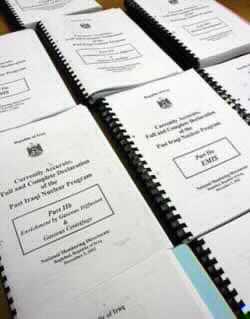Iraq handed the United Nations a huge dossier on its military programs, denying that Iraq has any banned weapons and setting the stage for a confrontation with Washington. The presentation of the report on Saturday was followed by release of a statement from Washington implying that anything short of an admission of possession represented a lie. The dossier has 11,807 pages, 352 pages of supplements and computer disks with 529 megabytes of data, according to captions on a display at the headquarters of the Iraqi National Monitoring Directorate.
Hussam Mohammed Amin, head of the Directorate, said that in the dossier he delivered to U.N. inspectors in Baghdad: "We declared that Iraq is empty of weapons of mass destruction. I reiterate; Iraq has no weapons of mass destruction."
Amin said the dossier details "some activities that are dual-use," referring to technology that has both peaceful and military applications.
"If the U.S. has minimum levels of fairness and bravery it should accept the report," Amin said.
The Iraqi declaration will be examined by the International Atomic Energy Agency in Vienna and the U.N. Monitoring, Verification and Inspection Commission, known as UNMOVIC, in New York.
U.S. HAS "SUBSTANTIAL EVIDENCE"
In Washington, a senior U.S. official told reporters, "I think we have substantial evidence. Since 1998 there has been a number of pieces of information, intelligence evidence, that suggest that a number of these programs not only continue but have accelerated. ... There are things, of course, that we're not going to make public."
He suggested that the United States may provide additional intelligence and other support to U.N. inspectors in Iraq, who have said it was needed to do their job.
The official spoke at a briefing on condition that his remarks be released Saturday evening, after Iraq turned over the U.N.-mandated declaration of its capabilities in weapons of mass destruction and ballistic missiles.
"Iraq has to demonstrate that they have disarmed. ... "We're looking for a strategic shift on the part of the regime in Baghdad. We have not seen that shift as of yet. If it were to be a complete and accurate declaration, one could say that there had been a significant shift," said the official.
President Bush has vowed to lead an international coalition to disarm Iraq by force, if necessary.
It was likely that Washington would make at least portions of the Iraqi declaration publicly available, along with the U.S. assessment, the official said.
The United States alleges Baghdad has biological, chemical and nuclear weapons programs in violation of U.N. agreements reached after the 1991 Gulf War, which expelled Iraq from Kuwait, following an invasion.
The official said Washington was working with leaders of the U.N. teams to increase their intelligence and other capabilities. "I'm quite certain that we will be providing support ... in many different forms," he said.
U.N. DELAYS RELEASE
U.N. Security Council members have decided to postpone the public release of the Iraqi documents for as long as a week to allow experts to screen it for any military secrets that might help outsiders develop their own doomsday weapons.
Diplomats say it could take a week before the 15 Security Council members get a copy.
U.N. arms inspectors must report to the Security Council by Jan. 26. They can flag any Iraqi violations sooner.
Weapons experts returned to Iraq last month for the first time in four years. They say Baghdad has cooperated with searches at around 20 suspect sites so far.
The White House said it would analyze Iraq's declaration on banned weapons for its "credibility and compliance," but expressed skepticism.
Bush said earlier on Saturday his administration would take some time to judge the declaration, but repeated that it would disarm Iraq by force if necessary. Earlier this week he said bluntly that Iraq holds weapons of mass destruction.
U.S. officials said on Friday Washington was expected to declare Iraq in "material breach" of last month's U.N. resolution 1441 if it stated it had no such weapons, setting the stage for a possible U.S. military attack on Iraq.
But they said Washington would not cite the breach as immediate grounds for war, letting U.N. inspections continue while Bush courts partners to help strike Iraq if needed.
Earlier on Saturday a team of U.N. arms experts revisited Iraq's main nuclear research facility while a second examined a new military industrial research center.
PHOTO CAPTION
A mass of documents detailing Iraq's nuclear, chemical and biological activities is presented to the media in a government office in Baghdad Saturday Dec. 7 2002. The 12,000 pages declaration is to be handed over to UN officials later in the day before being flown to New York and Vienna Sunday. (AP Photo/Jerome Delay)
- Dec 07 10:35 AM ET
- Author:
& News Agencies - Section:
WORLD HEADLINES


 Home
Home Discover Islam
Discover Islam Quran Recitations
Quran Recitations Lectures
Lectures
 Fatwa
Fatwa Articles
Articles Fiqh
Fiqh E-Books
E-Books Boys & Girls
Boys & Girls  Hajj Rulings
Hajj Rulings Hajj Fatwas
Hajj Fatwas














